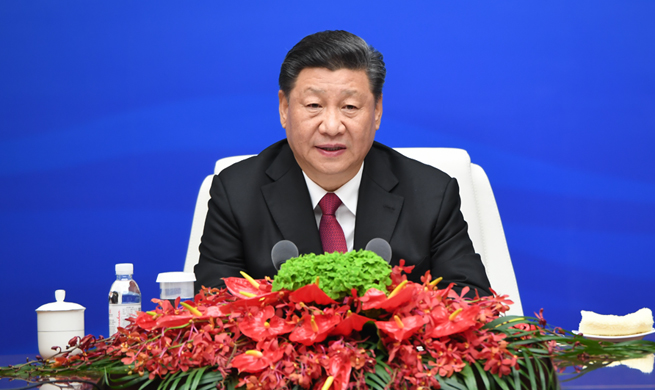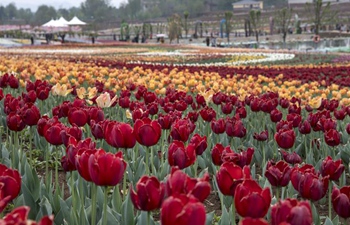by Alessandra Cardone
ROME, April 23 (Xinhua) -- Data showed the share of book readers in Italy has stabilized over the last years, after recovering from record-lows earlier in the decade, while publishers were increasing and diversifying their offer to intercept new clients.
As the UN-sponsored World Book Day was being marked at international level on Tuesday, several events were held in public libraries and bookshops across Italy to promote reading.
Despite the improvement registered recently, in fact, Italy lags behind other major European countries in terms of reading habits.
MANY WOMEN, TEENS AMONG BOOK LOVERS
At least 41 percent of Italians aged six and over read at least one book in Italy in 2017 for other purposes than school or work, according to the latest report by the National Institute of Statistics (ISTAT).
The figure marked a modest increase against the previous year (40.5 percent), but confirmed a recovering trend for the Italian book market.
The percentage of readers showed in fact a remarkable growth compared to the beginning of the century: it moved from 38.6 percent in 2000 to 44.1 percent in 2006, and to 46.8 percent in 2010.
Yet, it faced a clear decline starting from 2011 -- the year in which the global crisis hit hard the Italian economy -- dropping to 45.3 percent, and never fully recovering to previous levels.
According to ISTAT, "women showed a higher familiarity with books: 47.1 percent of them were estimated to be book readers, versus 34.5 percent of men."
Data further showed the share of readers exceeded 50 percent among those between 11 and 19, and "the age group that read the most was the one composed by people aged 11-14 (55.9 percent)", ISTAT stressed.
GROWING MARKET
Overall, the Italian book market posted a turnover of 2.77 billion euros (3.1 billion U.S. dollars) in 2017, which "confirmed the recovery after a long period of recession", according to the Italian Publishers Association (AIE).
The trend was positive for the third consecutive year, and showed an increasing growth rate: some 0.2 percent in 2015, 1.2 percent in 2016, and 2.8 percent in 2017.
"If we also consider sales on Amazon (online retail giant) and second-hand books, the 2017 turnover reaches 3.1 billion euros, with a 4.5 percent rise against 2016," the AIE Research Dept. stressed in its latest report on the publishing industry.
This result was achieved by overall 1,459 active companies, which published 70,159 titles and printed more than 161 million copies in 2017, according to ISTAT.
Book production increased by 9.3 percent in terms of titles published, and by 14.5 percent in terms of printed copies.
Some 38.3 percent of all books published in 2017 (some 26,870 titles) were also offered in e-book format, while the digital offer for schoolbooks exceeded 70 percent.
Finally, the latest ISTAT survey among publishers showed the role of independent libraries was considered "strategic in intercepting the audience of actual and potential readers".
INDEPENDENT LIBRARIES' STRUGGLE
Most publishers saw independent libraries as "the most efficient channel to increase demand and widen the book market", also compared to online bookstores and cultural events.
Despite such acknowledgement, independent libraries were struggling to survive in Italy.
According to AIE data, their number dropped from 1,115 in 2010 to 811 in 2016, meanwhile bookshops within large-scale retail and bookstore chains -- Italy's biggest being Feltrinelli and Mondadori -- grew from 786 to 1,052.
Talks with an experience book assistant at the Altroquando in the historic heart of Rome confirmed that love for books and strong commitment were crucial ingredients to survive on the market.
"What you need first and foremost is a great passion... It is essential, because an independent bookshop in Italy is not a source of major earnings," Michele Iacono, 40, told Xinhua.
Altroquando was renowned in Rome for staying open 365 days a year, and until 1.30 a.m. at night, which was very unusual for bookshops in Italy.
It also had an underground space where people could drink and read after 6 p.m., and where meetings, readings, book presentations, and workshops were regularly hosted.
Offering parallel activities, and creating a wider culture-friendly environment, was seen as a way to support the book sale.
"Associating parallel activities to book sale can be good, although I must specify that books remain the heart and soul of our commitment," explained Iacono.
For example, every Monday the bookshop hosted linguistic tandems of foreign and Italian students exchanging conversation, and every Tuesday a "Stand-Up Comedy Garage" evening with local comedians.
The bookshop paid great attention to the publishing houses, and especially to small publishers and authors that might get neglected by readers in large book chains.
"Considering the nature of our offer, our clients are on average quite different from those of a bookstore chains, and most of them come here knowing already what they look for," the assistant said.
Another helping factor was the location, in a semi-pedestrian cobbled street of the historic center, which allowed the bookshop to intercept both residents and tourists.
From their first-hand perspective, the Altroquando staff confirmed Italians were "gradually reading more books", although remaining on average behind other major European Union (EU) countries.
When asked about whether he was optimistic about the independent bookshops' future, however, the shop assistant's answer was noncommittal.
"I do not have a clear answer... What I do know is that we are engaged in a medium-long term project," Iacono said.
"We are here and we are proactive, and I hope this choice will be rewarded in the long period."












